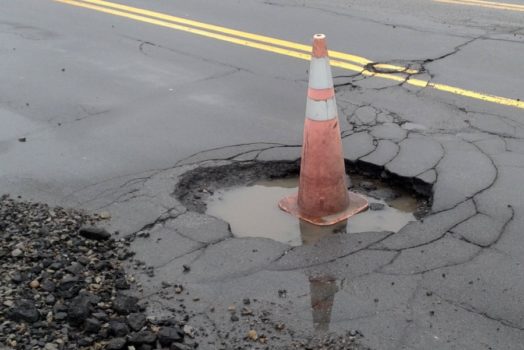
By RICK BRUNDRETT
Although nearly $1 billion has been collected since the state gas-tax-hike law went into effect more than two years ago, the S.C. Department of Transportation has completed less than 20% of identified paving projects statewide with those funds, newly released agency records show.
The Nerve’s latest review found that of a total 1,967 listed “pavements” projects in the state’s 46 counties, 317, or 16.1%, had been completed through Nov. 30. Eight counties had completion rates of less than 10%, including the larger counties of Lexington (7.8%), Richland (7.5%) and Charleston, which ranked at the bottom at 2.04%.
Only one county – Saluda – had reached the 50% completion mark over the 29-month period, while more than half of the counties had completion rates of less than 20%, The Nerve’s review found. The total number of listed “pavements” projects in South Carolina ranged from 16 in Saluda County to 126 in Orangeburg County.
Yet during the same period, the state collected $963.5 million in total revenues under the gas-tax-hike law – $124 million more than the estimated cost of all identified paving projects statewide, and which represented nearly 79% of the overall $1.2 billion in project “commitments.”
As of Nov. 30, a special fund created with the gas-tax-hike law had a cash balance of $464.3 million, which represented about 48.2% of total collected revenues, according to DOT and state comptroller general records.
In passing the law, which raised the state gas tax 12 cents per gallon over six years and increased other vehicle taxes and fees, lawmakers promised that the money would go toward fixing deteriorating roads and bridges in their constituents’ communities. DOT has said 80% of the state’s approximately 42,000 miles of roads needs repaving or rebuilding, and identified 465 out of 750 “structurally deficient” bridges to be replaced.
DOT plans to complete about 2,300 miles of road repairs by the end of next year, though as The Nerve has previously reported, that number represents less than 7% of the approximately 33,600 miles of state roads that the agency has designated to be resurfaced or rebuilt. Under its 10-year plan, DOT aims to bring about 16,800 miles of state roads up to a “good” rating.
The Nerve’s latest review found that of 2,985 miles of identified “pavements” projects statewide, 711 miles, or about 24%, had been completed through Nov. 30 with gas-tax-hike funds. The lengths of completed projects ranged from a 19.3-mile stretch of S.C. 125 in Allendale County to a .002-mile section of U.S. 501 in Marion County, according to DOT records.
Despite lawmakers’ promises to repair bad roads and bridges with gas-tax-hike money, DOT has designated $247.2 million, or 20.2%, of the total $1.2 billion in project “commitments” for interstate widenings. The agency began to more clearly acknowledge those plans following a January 2019 Nerve story.
In October, a state Senate panel, called the “Special Interstate Subcommittee,” held its first public meeting to discuss accelerating interstate expansion. The panel was created by longtime Sen. Hugh Leatherman, R-Florence, who is chairman of the budget-writing Senate Finance Committee and a member of the State Transportation Infrastructure Bank (STIB) board, which over the years funneled several billion dollars to large construction projects in select counties.
The South Carolina Policy Council, the parent organization of The Nerve, has contended the gas-tax-hike law, which took effect July 1, 2017, was written in a way to allow DOT to divert revenues to the STIB to pay off bond debts.
Following a breakdown of the total number of identified “pavements” projects, with the number of completed projects in parentheses, by county as of Nov. 30, according to DOT records:
- Abbeville: 49 (9)
- Aiken: 117 (8)
- Allendale: 27 (4)
- Anderson: 76 (13)
- Bamberg: 44 (6)
- Barnwell: 47 (6)
- Beaufort: 38 (5)
- Berkeley: 49 (7)
- Calhoun: 42 (3)
- Charleston: 98 (2)
- Cherokee: 18 (6)
- Chester: 21 (9)
- Chesterfield: 47 (4)
- Clarendon: 36 (8)
- Colleton: 26 (8)
- Darlington: 29 (5)
- Dillon: 24 (9)
- Dorchester: 47 (14)
- Edgefield: 27 (11)
- Fairfield: 20 (4)
- Florence: 52 (8)
- Georgetown: 36 (6)
- Greenville: 44 (7)
- Greenwood: 63 (11)
- Hampton: 56 (3)
- Horry: 48 (6)
- Jasper: 27 (7)
- Kershaw: 24 (6)
- Lancaster: 29 (4)
- Laurens: 32 (7)
- Lee: 17 (3)
- Lexington: 76 (6)
- Marion: 17 (7)
- Marlboro: 23 (5)
- McCormick: 21 (9)
- Newberry: 32 (7)
- Oconee: 34 (5)
- Orangeburg: 126 (4)
- Pickens: 41 (7)
- Richland: 106 (8)
- Saluda: 16 (8)
- Spartanburg: 48 (10)
- Sumter: 23 (10)
- Union: 18 (8)
- Williamsburg: 29 (7)
- York: 47 (7)
Editor’s Note: The South Carolina Policy Council, the parent organization of The Nerve, has launched “Project Road Repair” to encourage citizens to contact their lawmakers about getting their bad roads fixed. To learn more about the project, go here.
Brundrett is the news editor of The Nerve (www.thenerve.org). Contact him at 803-254-4411 or rick@thenerve.org. Follow him on Twitter @RickBrundrett. Follow The Nerve on Facebook and Twitter @thenervesc.
Nerve stories are free to reprint and repost with permission by and credit to The Nerve.
